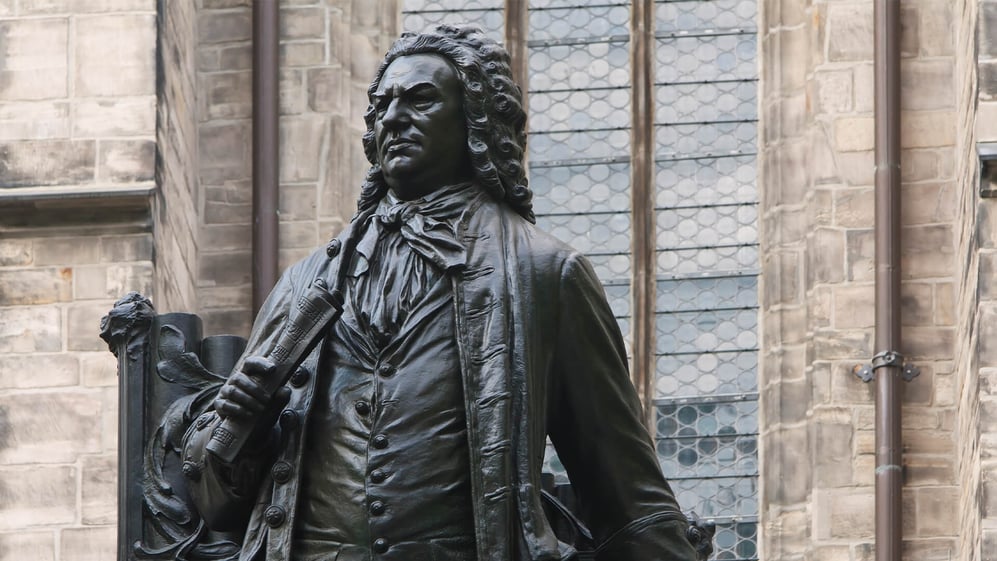While reading a child’s version of the biography of Johann Sebastian Bach to my students recently, I was struck with how much Bach learned from the “masters.” When practicing and perfecting his art, Bach intentionally sought out music written by those who preceded him whose works were masterful and worthy. Bach’s method of learning music in this way provides a powerful example of the way in which we should learn and teach music.
Teachers Teach by Example
The most powerful teachers lead by example. As such, teachers who continually learn from the “masters” themselves—whatever that might look like in various subject areas— set a good example for their students who take to heart more of what their teacher does than what they say. For example, a teacher who urges the importance of staying in the Church for life makes a bigger impact when their students actually see them in church Sunday after Sunday. If they're not present, the students come to think that their teacher does not truly mean what they say and begins to ignore the teaching. Likewise, a teacher who urges their students to listen to great music makes a bigger impact if the students discover them, at least one time or another, listening to Haydn or Mendelssohn, playing Mozart or Chopin on the piano, or providing a Buxtehude prelude on the organ on Sunday.
In general, teachers should continue learning from the masters of their respective art, even if the masters do not represent the entirety of their repertoire. In music class, this looks like providing students the opportunity to listen to great works of music that they will probably not hear at any other time in their life. Some students may continue through life uninterested in the great works of music, but one or two may take it upon themselves to look up a playlist of a composer who struck their fancy, like a student of mine did with Maurice Ravel earlier this year. Those one or two students are worth all the effort. Music teachers also have the opportunity to introduce their students to the great “masters” in music class by guiding their students through learning a choral or instrumental piece at their level. Most simply in a Lutheran school, this may look like learning hymns.
Immersion in the Works of the “Masters” Encourages Mastery
Learning from the masters in music means knowing the music of the masters well enough to replicate it. This may mean listening to an excellent recording of a piece again and again to capture the tone, rhythm, dynamics, articulations, and the like, as best as possible. As my piano students prepare for their upcoming recital, I realized that they all would benefit from actually hearing their piece played by talented musicians, whether that piece is from the Star Wars franchise or Beethoven’s Pathétique Sonata. When rhythms are not exactly right or the feeling of a piece is off, I realize it is because my students need to spend more time listening to masterful performances, whether it is a cinematic masterpiece or a Romantic beauty.
Consider that the great masters themselves led by example, at least as concerns their musical abilities. They did not teach students only by their speech, but they actually wrote music that would teach through the very action of playing it. This music, too, was no childish drivel; it was excellent music that taught students not only technical skills but instilled in them the knowledge of what is good. The masters showed the importance of their musical art by creating excellent music, thereby treating music in general with respect and dignity.
Mastery of Discernment
As the next generation of musicians learns to play and sing well, they need not only the technical skills to do so, but they also need the skill of discernment. Discernment teaches a student to distinguish the good from the bad and the frivolous from the edifying. It also encourages a student to love the good and edifying over the bad and frivolous. This applies not only in music but also in art, literature, and personal habits. The best way to learn such things is to immerse oneself in good things, such as masterful works of art, literature, and music.
The more I listen to the masters, the more I learn and the better I play. Beyond this, the more I listen to the masters, the more joy and beauty I experience in life. After all, we do not, or should not, perform music for the accolades and the fame and glory. Rather, we again follow the masters’ lead by saying, as Johann Sebastian Bach wrote at the end of his sacred works, S. D. G.—Soli Deo gloria: Glory to God alone.
Learn from the masters by exploring new music settings and compositions for organ, choral, and handbell.












.jpg?width=50&height=50&name=IMG_20220621_160541_456%20(1).jpg)



